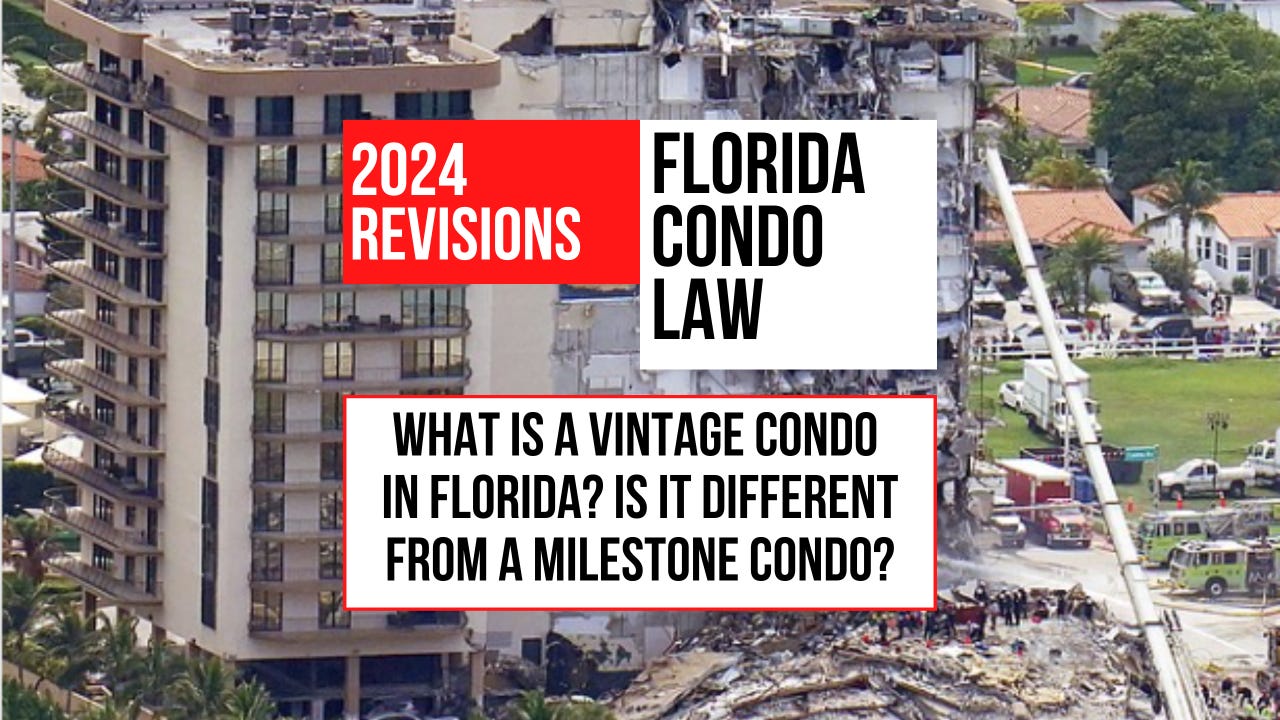What Is A Vintage Condo In Florida? Is It Different From A Milestone Condo?
Following the Surfside condo collapse, Florida condos now fall - based on our designation for statistical purposes - under three general categories: New, Used and Vintage.

If you are attempting to buy - or maybe already own - a unit in Florida, it is increasingly important to understand for pricing purposes the difference between a new, used and vintage condo.
The terms are not an official designation - as we are introducing the names right here - but is likely to significantly influence public perception, resale pricing and monthly maintenance fees in the Sunshine State going forward after a number of changes to the Florida Condo Law.
Going forward, we will start tracking all condo resale statistics based on when units were constructed. New units are those that are less than 10 years old. Used condos are units that are at least 10 years. Vintage condos are units that are between 25 years and 30 years old depending upon the county in which the building is located.
County governments have the power to pull forward the Milestone Study age requirement to 25 years from 30 years if a property is located within three miles of the coastline.
It can get a bit confusing given the contingencies. For the sake of simplicity, we will assume a Vintage condo is 30 years old unless otherwise noted.
For all practical purposes, the easy way to view a condo now is whether it was constructed before or after the year 1994.
It is worth noting, the year 1994 is a moving target that changes with the calendar year.
Why? The answer is, Florida requires condo associations to complete a comprehensive safety evaluation of their respective buildings before the 30-year anniversary - and 25-years in some situations - of opening.
This safety check up, of sorts, represents a significant milestone in the building’s lifespan.
The evaluation, therefore, is called a Milestone Study.
We will use the 30-year anniversary study - and 25 years in some counties - to differentiate newer from older when comparing condo buildings.
It is worth noting, you may also see us use the term Milestone as a synonym for vintage projects when discussing whether a condo building has been open for more than 25 years.
In the aftermath of the June 24, 2021 collapse of the Champlain Towers South in the town of Surfside on the barrier island of Miami-Dade County, everyone from residents to building inspectors, politicians to bankers understand better than ever the importance of ensuring that no Florida condo building ever unintentionally collapses again.
Nearly 100 people died and a $1 billion settlement was reached with the families of the victims.
A federal investigation is currently underway but the preliminary reports suggest a flawed design coupled with a lack of upkeep by the condominium’s association contributed to the disaster.
The Florida Legislature has taken a number of steps - prompted by insurance companies threatening to withdraw coverage in the state - to ensure that nothing like this ever happens again.
Watch and/or listen to the four-part narration of the 2024 revisions to the Florida Condo Law.
Up until now, the state’s measures were being implemented slowly but that all changes in 2025 when many of the measures take effect.
As part of the changes, the public is increasingly seeking information regarding the structural integrity of the condo buildings that they live in or are considering purchasing.
Florida has two-prong approach - a Structural Integrity Reserve Study (SIRS) and the previously mentioned Milestone Study - to gauge a building’s condition.
Every 10 years, Florida requires a SIRS to be conducted by experts - such as engineers, architects and reserve specialists - to determine the physical and financial status of all residential structures in a condo association that are at least three-stories high.
The SIRS provides a roadmap for condo association board members - who are usually volunteers that own in a project - to better understand the physical condition of the buildings in a community and what it will cost to maintain them in the future.
A SIRS is not to be confused with the more safety-oriented Milestone Study.
More detailed information about the SIRS law and a video narration of the 2024 revisions to Florida’s SIRS and Milestone law are behind this paywall.
To read the rest of this report or to watch a video narration of this part of the SIRS and Milestone Study law, you will have to be a member of the Miami Condo Market Investing Club™. As a Club member, you will have access to the rest of this report as well as all of our published reports, statistics and proprietary research.
Please note, we are not attorneys and only attempting to understand the Florida Condo Law. If you have any legal questions, please consult your attorney for legal advice.




